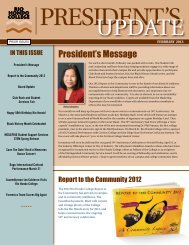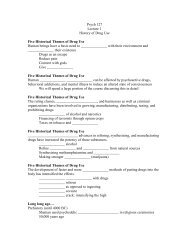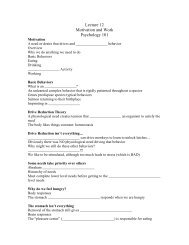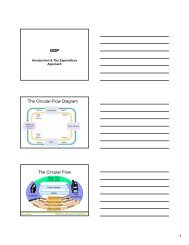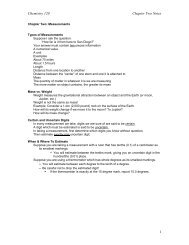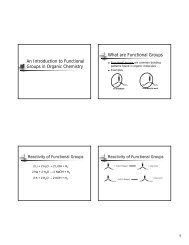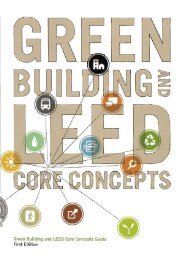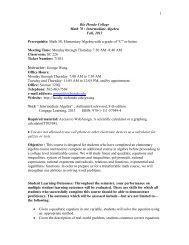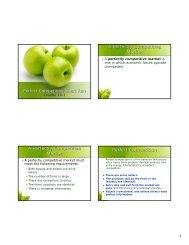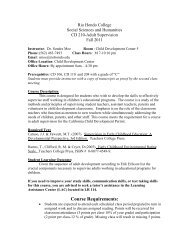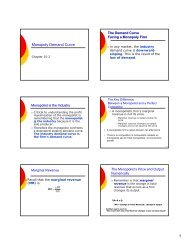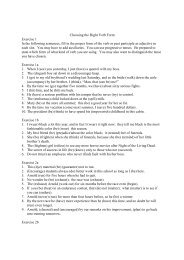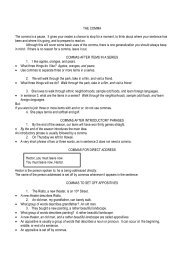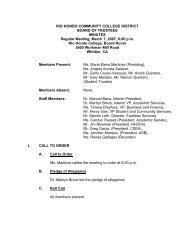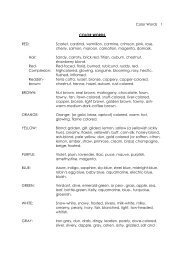Complete College Catalog 2011-2012 - Rio Hondo College
Complete College Catalog 2011-2012 - Rio Hondo College
Complete College Catalog 2011-2012 - Rio Hondo College
You also want an ePaper? Increase the reach of your titles
YUMPU automatically turns print PDFs into web optimized ePapers that Google loves.
7 <strong>College</strong> Policies & Procedures<br />
Current <strong>Rio</strong> <strong>Hondo</strong> <strong>College</strong> Board Policies and Administrative Procedures<br />
can be found on the web site: (www.riohondo.edu/board/policies.htm).<br />
Access to Student Records<br />
All currently enrolled or former students have the<br />
right of access to any records relating to them and<br />
maintained by the <strong>College</strong>. Students may inspect and<br />
review records during regular business hours in the<br />
Office of Admissions and Records. Requests for access<br />
to records will be granted no later than five working<br />
days following date of request. Qualified personnel<br />
will be present to interpret records for students.<br />
<strong>College</strong> personnel may also permit access to student’s<br />
records to any person for whom the student has<br />
executed written consent specifying the records to<br />
be released and identifying the party to whom the<br />
records may be released. <strong>College</strong> personnel will notify<br />
the recipient of such records that the transmission of<br />
information to third parties is prohibited.<br />
Cheating/Plagiarism<br />
Cheating is defined as obtaining or attempting to<br />
obtain credit for work by the use of any dishonest,<br />
deceptive, fraudulent, or unauthorized means.<br />
Helping someone commit an act of academic<br />
dishonesty is also considered cheating. Examples<br />
include, but are not limited to:<br />
1. Unacceptable examination behavior –<br />
communicating with fellow students, copying<br />
material from another student’s exam or allowing<br />
another student to copy from an exam, possessing<br />
or using unauthorized materials, or any behavior<br />
that defeats the intent of an exam.<br />
2. Plagiarism – taking the work of another and<br />
offering it as one’s own without giving credit to<br />
that source, whether that material is paraphrased<br />
or copied in verbatim or near verbatim form.<br />
3. Unauthorized collaboration on a project,<br />
homework, or other assignment where an<br />
instructor expressly forbids such collaboration.<br />
4. Documentary falsification including forgery,<br />
altering of campus documents or records,<br />
tampering with grading procedures, fabricating<br />
lab assignments, or altering medical excuses.<br />
Consequences of cheating/plagiarism may include:<br />
1. Receive an “F” in the course.<br />
2. Receive a 0 on that assignment.<br />
3. Be referred to the Dean of Student Life for further<br />
disciplinary action.<br />
Children on Campus<br />
Except when children are enrolled in the Child<br />
Development Center, other instructional programs in<br />
the District, and/or attending public events under the<br />
supervision of parent or guardian, bringing children<br />
on campus while attending classes is not permitted.<br />
Parents and guardians must be aware that the<br />
ultimate responsibility for the safety of the children<br />
in their care rests with them and no liability can be<br />
accepted by the District nor any of its agents or staff<br />
for the consequences of children being on campus.<br />
Computer Usage<br />
Each computer user is responsible for the use of<br />
computing resources in an effective, efficient, and<br />
lawful manner. Computing resources and equipment<br />
are college property, and the college retains the<br />
right to monitor systems and limit access. Users<br />
of computing resources must abide by the rules/<br />
policies established by the department responsible<br />
for the supervision of the equipment. Each user<br />
must understand and acknowledge that his/her<br />
freedom to access and display information is limited<br />
to authorized academic and administrative uses. No<br />
person may use computer resources for any illegal<br />
act, including the possession or use of programs,<br />
files, or instructions for violating system security or<br />
violation of copyright law. Computer resources may<br />
not be used to intimidate or create an atmosphere of<br />
harassment based upon any protected class/category<br />
(gender, race, religion, ethnic origin, creed, or sexual<br />
orientation, and other categories as applicable).<br />
Grievance Procedures<br />
<strong>College</strong> Review Board<br />
Students who have a grievance against any faculty or<br />
staff member may request a hearing by the <strong>College</strong><br />
Review Board. A grievance is an alleged wrongful<br />
act by a <strong>Rio</strong> <strong>Hondo</strong> <strong>College</strong> staff or faculty member<br />
which has an adverse effect upon a students academic<br />
or personal status at <strong>Rio</strong> <strong>Hondo</strong> <strong>College</strong>.<br />
The Review Board is composed of three members<br />
from the full-time faculty, three members of the<br />
student body and one member of the administrative<br />
staff. Petitions requesting a hearing before the <strong>College</strong><br />
Review Board may be picked up and returned to the<br />
38 / <strong>Rio</strong> <strong>Hondo</strong> <strong>College</strong> <strong>2011</strong>-<strong>2012</strong> <strong>Catalog</strong>



